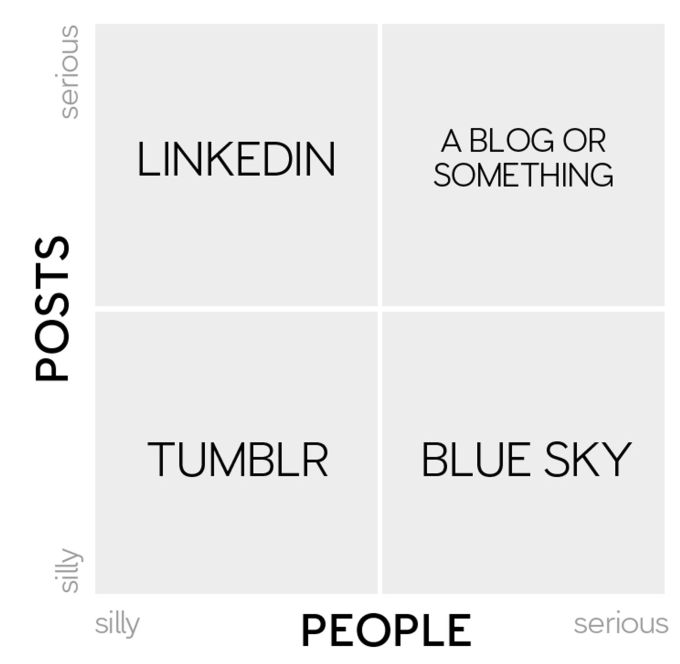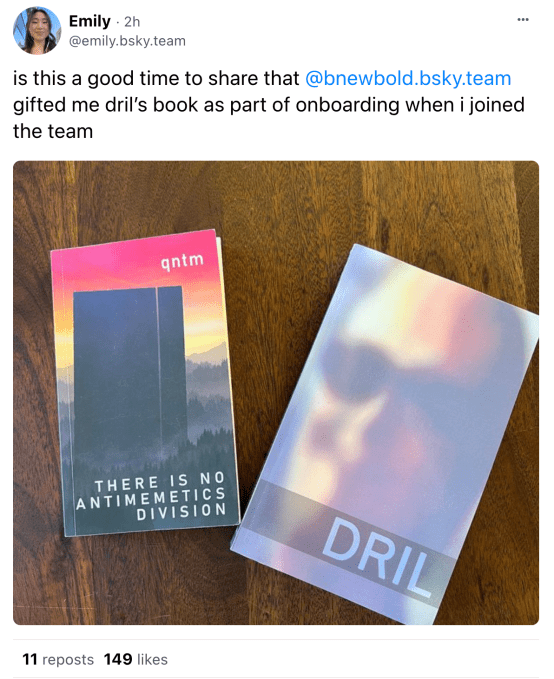
You have joined many social media sites since October 27, 2022, the fateful day Elon Musk paid up his net worth and volunteered to do the worst job in the world. There is Mastodon, T2, Spoutible, Hive, Post, Cohost, and many more, but no alternative to Twitter looks as promising as Bluesky. This is, in part, because of the amount of shit going on out there.
Bluesky grew out of the Twitter nest in 2019, when Twitter founder Jack Dorsey announced that the platform would fund a small, independent team to develop a decentralized social media standard. Like Mastodon, Bluesky plans to be standardized, which means that endless single-player communities can exist within an open source network. Before we even thought Musk would buy Twitter, the “bluesky initiative” was central to the company’s long game — now, the indie team has launched its invite-only beta, which is still running with Dorsey funding. (Yes, we know how sad it is to be so excited about a Twitter alternative being literally funded by the Twitter founder who publicly declared Musk the “only solution” he trusted with his old company.)
Pavel Samsonov, a Bluesky savvy user, wrote:bluesky (serious people who post silly little posts) is the spiritual antithesis of LinkedIn (very silly people trying to write serious ideas). Samsonov even included a handy visual aid.

Image credits: Pavel Samsonov on Bluesky
It’s an apt description. I see the same journalists and technologists I follow on Twitter — I even found someone I know from Weird Facebook — but people aren’t talking about earnings reports, layoffs, and stocks. At this very moment, Bluesky is a bunch of people who are still the adrenaline junkies of Twitteresque microblogging, but are exhausted by the constant onslaught of greedy rhetoric and musky shenanigans. Enter: shitposting.
In what looks like a few days, a ridiculous and chaotic culture has sprung up on Bluesky. There’s no name for the posts, like how Twitter posts tweets, or how Mastodon used to have raspberries until they retired that brand because they’re wimpy. So, people call Bluesky’s posts “skeets,” which is a combination of “tweet” and “sky” and I’m pretty sure it’s slang for slander, but I won’t check that because I’m stuck with one last piece of reason.
Rich Burrows, a developer advocate, believes that this culture was shaped from the top down. Some of the Bluesky developers are very active on the platform they’re building in real time, responding to user questions, complaints, and feature suggestions, all while still acting like a real person.
“Some of the staff seem to have done the dirty stickers themselves, which I think is a great energy that was lacking in other Twitter alternatives,” Burroughs told TechCrunch. “People continue to build these very serious sentiment platforms to compete with Twitter, but what’s happening on Bluesky is very similar to Twitter’s early days, and why it became so successful.”
After publicly feuding with Musk, who gave him a blue check against his will, the legendary Dril joined forces with Bluesky today. Bluesky employee Brian Newbold wrote, “If the first @dril.bsky.social poast sucks, we’ll burn it all and try again.”

Image credits: @emily.bsky.team on Bluesky
Dril fandom seems to be the rage among Team Bluesky. Another developer, Emily Liu, posted that Newbold gifted her a book of his best Drill tweets when she joined the team (there’s also a book called “No Anti-Vomiting Section” pictured, which seems like something I should read ASAP). This fact seemed a little too idealistic to argue into my hypothesis that Bluesky would succeed by deliberately farming fouling, so I checked again with Newbold to make sure this was legit. He replied, “It is Bluesky PBLLC’s stated general policy that all new employees receive the best @dril.bsky.social tweets in print.” Do whatever you like.
As disgruntled Twitter users scrambled to find a new platform to call home, some flocked to Tumblr, another social network that has largely failed to monetize because its user base is willfully resistant to behaving predictably. When Tumblr rolled out a creator subscription product, users were fiercely opposed to it. As of data from November, more Tumblr users have purchased dashboard crabs (split crabs that dance around your dashboard and can be gifted to friends) than actual creator subscriptions. And as a highly targeted method, Tumblr also offered users the chance to purchase not one, but two $8 blue checks.
In spirit, Bluesky feels a little Tumblr-like, except I’ve yet to see anyone drop a link to the Archive of Our Own and/or Ray-Ban sale. But unlike Tumblr, these aren’t high school kids talking about “the supernatural.” They’re adults with jobs who are looking for a social media experience as far away from LinkedIn as possible.
Sure, this is all a generalization, and there are probably some very serious aspects of Bluesky that I haven’t encountered yet. But Bluesky seems to have taken what people enjoyed about Mastodon and Twitter and combined it together, without many of the bad parts. Although Bluesky’s architecture is similar to that of Mastodon, Bluesky is intuitive, whereas Mastodon seems inaccessible: choosing which instance to join seems like an impossible task, and longtime users are very defensive about their foundation. toting Post rules, which can make it intimidating to join the conversation. As technology reporter Paris Martineau writes in Bluesky, “Really, I think the mastodon failed because it discouraged publishing.”
Bluesky still has a lot to overcome. The platform has yet to deal with the widespread content moderation concerns that come with decentralization, and the app remains a walled garden (please don’t DM me for invite codes, I don’t have any). But at least for this sliver of internet history, Bluesky feels good. And Drill here.
